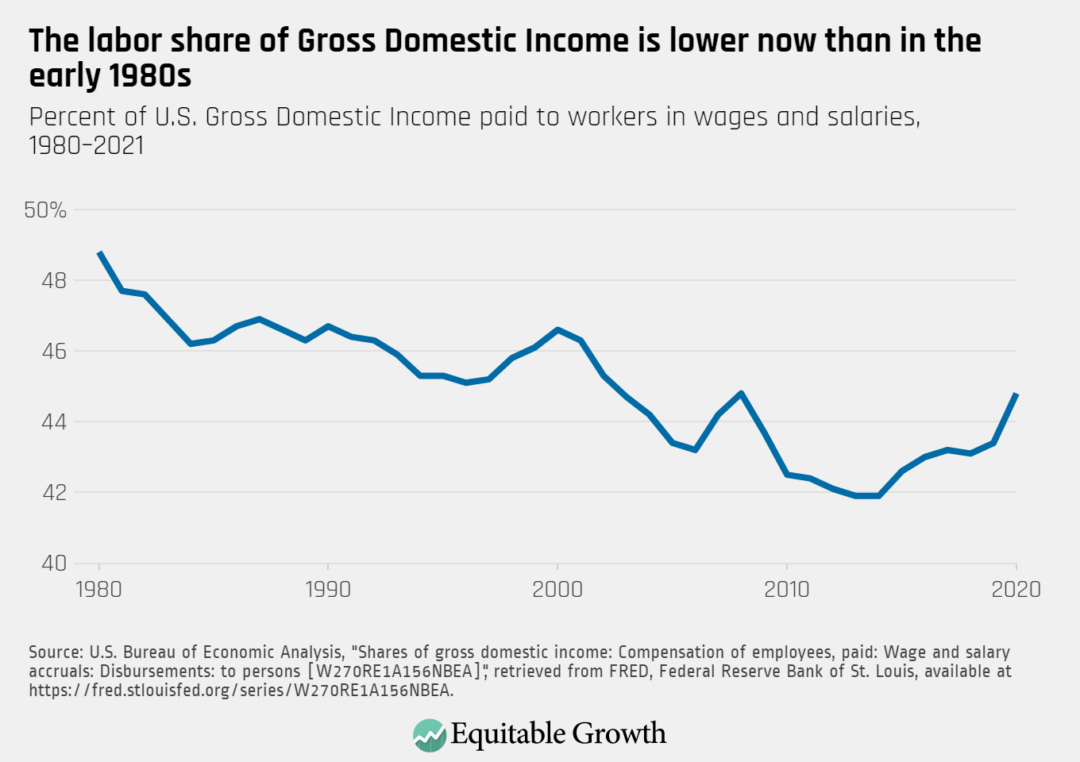OfTheCross
Veteran

How corporate governance strategies hurt worker power in the United States - Equitable Growth
Business strategies, including shareholder primacy, hurt workers, lower wages, and reinforce inequality in the United States.
Empirical evidence demonstrates that shareholder primacy lowers workers’ wages and worsens employment outcomes
While several scholars have long proposed that the rise of shareholder power affects workers, recent empirical studies contribute to the academic understanding of the size and importance of shareholder power’s effect, and the precise mechanisms through which shareholder primacy influences labor market outcomes.For example, an analysis by José Azar of the University of Navarra, Yue Qiu of Temple University, and Aaron Sojourner of the Upjohn Institute finds that greater common ownership in a labor market—or the concentration of investment positions of public companies in the hands of a few large institutional shareholders—is associated with both lower wages and a lower employment-to-population ratio. With about 1 in 3 U.S. private-sector workers employed in publicly traded firms, the concentration of shareholders across firms through common ownership by institutional investors could play a significant role in the overall structure of the labor market.
Likewise, in a new working paper, Antonio Falato of the Federal Reserve Board, Hyunseob Kim at the Federal Reserve Bank of Chicago, and Till von Wachter at the University of California, Los Angeles examine the relationship between shareholder power and workers’ earnings and employment. The authors find that as establishments experience an increase in ownership by institutional shareholders, they also experience a decline in employment and payroll costs. This finding holds both at the establishment and the industry level.
Moreover, Falato, Kim, and Von Wachter find that an increase in ownership by institutional shareholders explains about a quarter of the decline in the ratio of total wages and salaries to Gross Domestic Income—a metric that has seen an important drop in the past four decades— between 1980 and 2014. (See Figure 1).
Figure 1

Lenore Palladino at Smith College also studies the relationship between profits, shareholder payments, and wage growth, finding that as shareholder payments as a percent of companies’ profits grew, the share of profits that went to workers’ wages declined. In addition, through firm-level empirical analysis and accounting for macroeconomic factors and a number of firm-specific characteristics, Palladino shows that as shareholder payments as a portion of operating expenses increased between 1984 and 2017, wages paid to workers fell.
Evidence also shows that as shareholder primacy and the financialization of the U.S. economy more broadly influence workers’ outcomes, these trends also contribute to widening racial and gender inequality in the U.S. labor market. Indeed, a team of researchers finds that between the 1980s and the 2010s, the pay for workers in managerial occupations did not only outpace the pay of workers in other types of jobs, but White and Latino men also have benefited disproportionately from this financial and managerial wage premium.
Business practices that lead from shareholder primacy to inefficient and inequitable workplace outcomes
What mechanisms underlie the effect of shareholder primacy on workplace outcomes? One body of research looks at the role of managers and management practices. Indeed, it appears as though the rise of the shareholder primacy ethos, as taught in business schools, has reduced any tendency toward rent-sharing with workers. Following the guidance of economist Milton Friedman, who proclaimed “the social responsibility of businesses is to increase profits,” business school philosophy tends to view workers as costs rather than stakeholders.For example, Daron Acemoglu of the Massachusetts Institute of Technology, Alex He of the University of Maryland, and Daniel le Maire of the University of Copenhagen investigate how the rising number of managers with business degrees affects wages within workplaces in both the United States and Denmark—a research strategy that isolates policy and institutional landscapes across two different countries. The authors find that a greater proportion of managers with business degrees is associated with lower worker wages.
Acemoglu, He, and le Maire also are able to causally estimate this impact by looking at scenarios in which there is a retirement or death and a manager without a business degree is replaced by another person with a business degree. In the United States, the authors find that the appointment of a manager with a business degree results in a 6 percent decline in wages in the following 5 years. The authors estimate that these dynamics explain 15 percent of the slowdown in wage growth and 20 percent of the decline in the labor share in the United States since 1980.
What’s more, the increasing preponderance of managers with business degrees is not associated with higher firm output or productivity.
Policy proposals to return bargaining power to workers and foster broadly shared economic growth
Most evidence shows that efforts to maximize shareholder value do not just hurt workers’ labor market outcomes and lead to an increase in economic inequality, but also do little to increase firm profitability. Further, research suggests the shift toward shareholder primacy is a drag on economic growth. In Equitable Growth-funded research, for example, Florian Ederer of Yale University and Bruno Pellegrino of the University of Maryland find that common ownership—an ownership arrangement where a few institutional investors hold investment positions in a number of competing firms—reduces competition between firms, similar to monopolization, and decreases overall economic welfare across the U.S. economy.The promise of broadly shared growth in a market-based economy can only be realized in a legal, economic, and institutional context that supports worker power to offset the inefficient tendency toward inequality and wealth-hoarding under financial capitalism. In the current environment of shareholder primacy, research shows that these tendencies result in declining wages, deadweight loss, and a distorted distribution of economic value.
Measures to reinforce countervailing worker power include policies that will restore the strength and presence of unions in the United States. The decline of unions is associated with a variety of deleterious impacts for the U.S. economy. Reforming labor law to make worker organizing easier—such as provisions in the Protecting the Right to Organize, or PRO, Act that protect the right to strike, ensure union elections are fair, and make it harder for companies to misclassify their workers as independent contractors—would help restore union density.
Another effective measure is to increase worker and union representation on corporate boards. Research by Simon Jäger of the Massachusetts Institute of Technology, Benjamin Schoefer of the University of California, Berkeley, and Jörg Heining of the German Institute for Employment Research finds that so-called co-determination—or when workers have secured spots on company boards—does not diminish firm performance but does, in fact, diminish the likelihood that a firm will outsource work, without impacting wage levels.
Sectoral bargaining, where multiemployer groups bargain with unions for an entire employment sector in a specific location, and wage boards that include union representation would also provide a much-needed counterbalance to corporate strategies that push managers to cut wages and exploit workers.
Another piece of the puzzle for restoring balance in the economy and ensuring robust, broadly shared growth is reforms that diminish the exploitative power of finance. This would set the U.S. economy on a path toward a system of so-called stakeholder capitalism, in which corporate strategy is reoriented toward the interests of all relevant stakeholders, including workers, suppliers, and local communities.
To accomplish these goals, limiting stock buybacks and establishing board fiduciary duty to stakeholders would help reshape corporate governance away from shareholder primacy. This, in turn, may help ensure that workers can share in the value they create, as well as offset the potential for negative externalities, such as environmental costs.
These proposals would go a long way to fostering equitable economic growth in the United States by boosting worker power and shifting corporate strategies away from policies that center shareholder primacy.


